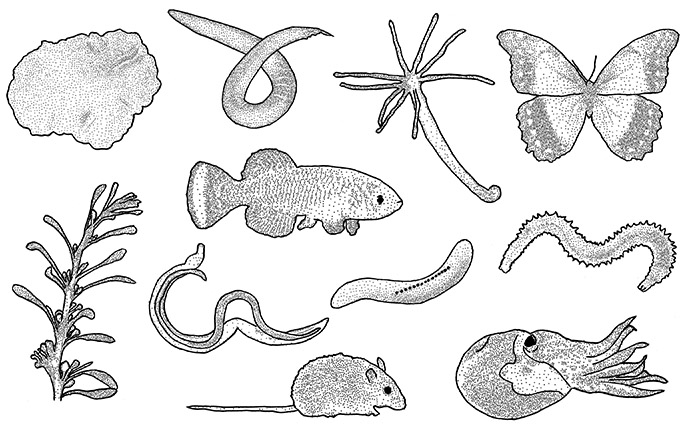The International Society for the History, Philosophy, and Social Studies of Biology meeting will take place in Oslo, Norway this year. Kate MacCord will give a talk on Germ line Regeneration.
Duygu will be on WCAI and WBGH for Living Lab Radio
WCAI's Living Lab radio program this Sunday, May 19 at Noon on WGBH (Boston) and again on Monday at 9 AM and 7 PM on WCAI (Cape Cod and Islands)
You can find the article and the recording here.
My Mental Health Under My Own Microscope
This blog post was initially published in Turkish on March 1st, 2013. For the mental health awareness month of May 2019, I decided to translate and share it here (it has very little edits from the original). This year, I have been encouraged to be more open about my mental health struggles, and my path to a more stable and happier life as an adult and academic. I still struggle, learning and growing never ends. But I have learned how to manage my mental health. I am so thankful to everyone else sharing their stories openly. Just like their stories helped me, I hope my story will help you.
My Mental Health Under My Own Microscope
The last time I posted here, I was in a great mood thanks to having started working out regularly. Since then, I have continued my regular workouts. So much so that, I even decided to run a half-marathon in Washington D.C.! For a while, I would either run or swim in the mornings on weekdays. But nowadays I am down to working out 3 days per week. Every day I run or swim I feel so much better (though there are exceptions, which I will talk about below), even if I wake up feeling down on that particular day. I even lost some extra weight at a healthy rate. So, it is good so far. No, not just good, it is wonderful!
Photo: From a morning run when I was in New York
However… I was hoping my mood swings, my brain’s “short-circuits”, my depression and anxieties were going to disappear with regular exercise, or at least would get largely under control. I was so excited about this new life prospect! Unfortunately, things didn’t turn out to be that way.
First of all, I am going through a tough time, when I am particularly vulnerable to feel depressed and anxious. We have funding issues at the lab I am working at. I have been aware of the situation since the summer, and my advisor and I tried to get more funds to close this funding gap. Unfortunately, our efforts did not pan out. Because of all this, I have been living in uncertainty since August: For how much longer will I be able to stay here at this lab, and in the US? Will this other application come through? (No) How about this other one? (No)… I tried to focus on 2-week-long aims and tried not to get paralyzed with worrying about the future. I continued to exercise regularly so that I would not lose my mind.
Life-Imaging
Meanwhile, two things happened: First, I started journaling my mood, and my exercise and meditation routine. Every night, before going to sleep, I recorded how I felt during the day (before and after exercise/meditation). At first, I didn’t have a particular aim in mind for journaling, I just wanted to have a record of all this. Second, I’ve been to Japan. (I’ll explain why I’m telling you this detail in a minute).
Photo: The notebook I am using for journaling my mood/exercise/meditation.
These were the circumstances when I periodically found myself in severe depression (3 times that lasted a couple days each, since November), even though I had been exercising and meditating regularly. Perhaps “severe depression” is not the right terminology, please feel free to correct me in the comments section. Here is what I mean by it: crying all day long and not being able to do anything else. Can rarely get out of the bed. This lasts several days. Eventually recovering and feeling normal. While depressed, feeling completely hopeless, seeing nothing but darkness in my future, feeling like a huge failure, feeling worthless, so so so worthless. But the weird thing is, this same person on “non-depressed” days (the days other people see and know me) is a person who feels strong, who is hard-working, self-confident, a person who sees the opportunity in hardship, who is able to think that things will be all right. You can imagine how confusing it is to experience these swings, both for me and for the people around me who are close enough so I let them see my mood swings.
Day’s Contrast
At last, about two weeks ago, when one of those depression fits held me by the legs again like a cruel giant, and slapped me to the wall, I said “That’s it!” and gave my therapist a call. I had not seen him in a while. He squeezed me into his schedule immediately. On the morning of my appointment day, I took my mood journal, and to better understand what’s happening to me, I decided to make a summary of my entries. While working on that summary I noticed “Wowowowow, I collected actual data!” It was one of the rare moments when I wanted to hug myself. I’m a scientist! I collect data! Transferred all the data points to a spreadsheet. Plotted a graph. Applied the days I had my period onto this mood score graph. Marked the times I had the nervous breakdowns (i.e. severe depression periods). And “Eureka! There is a pattern!” Here it is:
The blue line in this graph represents my mood score from negative to positive (black line is “zero”). The magenta star represents the nervous breakdowns, the salmon/pink columns are the days I had my period. The obvious pattern is that, during this time frame, I had 3 nervous breakdowns right before my periods. I didn’t have a nervous breakdown only before one period, though my body/mind certainly attempted but could not succeed breaking me down (16-18 December). And to me it is so clear why I was off the hook that month: I was traveling in Japan for 10 days (represented by the bar in teal green) and I had a great time. I always feel better when I travel to a new place. My body must have stocked up on serotonin so much that I was in a better mood in general that month (as you may have noticed from the blue line being above zero mostly that month). The months after this have the repeating pattern of “normal-ish” or “meh“ moods followed by a nervous breakdown the week before my period starts.
Deconvolution
With my very strong findings, I went to my therapist. “This is the situation dear Tom”, I said. He paused for a bit and he said, “My dear, you have PMDD”. “What the heck is that?!”, I asked. “Premenstrual Dysphoric Disorder”, he replied. Careful! This is not your usual PMS (which is already horrible). PMS is something most women experience to varying degrees. “PMDD is exactly what you describe. You feel pretty normal until it hits about 10 to 7 days before your period, and your mood changes drastically, much more severely than it would in PMS. If regular exercise isn’t helping (looks like it isn’t in your case), the other options are trying to go on birth control pills or going back on being antidepressants.” NOOOOOOOO NOT ANTIDEPRESSANTS!* I worked so hard to quit them. Ok let’s try birth control pills. (In theory, BCPs were to regulate my hormones, and potentially then prevent PMDD).
So, this is what’s been going on. I wanted to share all this because it is important to me. I feel like people take mental health issues too lightly or stigmatize. If you struggle with mental health problems, you may be afraid of being seen as “weak” or “spoiled” or “lazy” or whatever, fill in the blanks with negative verbiage. A lot of times, it is not just the fear of others calling you these things, but you yourself believing in these, and you end up hating yourself and beating yourself up. I am sharing my experience to bring more awareness to these issues. Please do not hesitate to get professional help (if you have the means). Please spend the time to know yourself, your patterns. If by sharing this I can help a couple of people, I will be so happy.
I have an appointment next week with the women’s health center to discuss birth control pills. We will see if they will help. I’ll share my experience as I go. And I will continue to journal my mood.
PS: Here is an article that explains the difference between PMDD and PMS.
Post-processing
An update to this blog post (in 2017): Birth control pills didn’t do it for me. I felt terrible on the one type of pill I tried. Eventually, what ended up helping was getting an IUD (intra-uterine device) in 2014 (I got Mirena). These hormonal IUDs release hormones locally, and they do not have the systemic effect the pills have. I miraculously stopped having the severe swings, though I still have light PMS-type mood changes. I also do not have cramps anymore as a bonus! Everybody reacts differently to these different options. The bottom line is, spend the time to try different options and hang in there! You’ll find a solution.
*Another update (in 2019): Even though my IUD helped a lot with getting some part of the troubles under control, after starting my new faculty position, I started having insomnia very regularly. (I had been suffering from this to some extent while in Paris, but it was manageable.) Even though at times I felt like I never felt happier in my life (thanks to being with my wonderful partner, finally living in the same place together, and having the dream job), I also started having to deal with lots of new anxieties that came with the new job. After spending a year trying to remedy the insomnia through not drinking coffee except in the morning, trying not to eat things that upset my stomach in the evening, mindfulness, reading books and staying away from screens once in bed, and therapy (I cannot thank my therapist enough for the growth she helped me achieve)… I mean I tried, and tried, and tried, and finally decided that it is time to go back on antidepressants. And life has been so much better. I am on a low dose, which helped so much with my sleep, but didn’t lose my motivation like it happened the first time.(this was one of the main reasons I had quit antidepressants back then). I hope you find your solution, and strength to look for a solution, whatever it may be.
Philosophy in Biology and Medicine
Duygu has joined the Philosophy in Biology and Medicine network as one of the science committee members.
Upcoming - Science Before Supper (Outreach)
Duygu will give a Science Before Supper talk at the Falmouth Library.
Details here.
Upcoming - NESDB Meeting, MBL, Woods Hole
Duygu will give a talk at the NESDB Meeting in April.
How to find a therapist and get therapy?
Written by: B. Duygu Özpolat
(Update: here is a google doc version of this document that is the most up to date)
Also, upon some suggestions, I want to highlight that everybody’s therapy experience, therapy needs, and what therapy methods work for them will be unique. So please be aware that this is me simply sharing my experience, but nothing I explain below is the only way of doing this. )
Looking for a new year resolution? How about getting therapy? You don't have to wait to have severe mental health issues, get help already, we all need it, especially in academia! Here is a little guide I wrote on "How to find a therapist and get therapy".
Also, this is still work in progress, and you can find the current version of this document here, and add your comments to that file if you like.
HOW TO FIND A THERAPIST AND GET THERAPY?
Disclaimer: I am not a therapist, all of this is from a client perspective.
I wanted to share my experience with therapy and write down a couple of things that may help taking steps towards therapy. Because I know the thought of getting therapy can be intimidating, where do you even start, right? Over the years I have worked with therapists and life/career coaches to get help. And with this document, I wish to demystify the process a little bit for those who are considering getting professional help, as well as invite you to consider getting help if you weren’t already considering.
Why is therapy useful and important?
I think a lot of people wait too long to go see a therapist. You do not need to have a severe mental health issue to go to a therapist. It is sad to me how often social stigma stops people from seeking help, which can improve their lives tremendously. For me, therapy not only saved my life but the shift in my understanding of myself, others, life, relationships was so big that I felt/feel like a completely new person thanks to therapy.
A therapist is so valuable because they do not have an agenda about you. Your kids, friends, family love you and they cannot separate their feelings and look at your situation from a neutral perspective. Often family and friends are hesitant to challenge each other fearing they may hurt feelings. Example: Your sister may think your ex-husband has a fair point on the conflict between you two, but she will be hesitant to tell you that, because you were hurt by your ex, and your sister doesn't want to appear they are taking his side (even though she may agree with him and not you). When people constantly agree with you, this hinders your progress and clear seeing of the situation. Therapists know how to challenge you without hurting you.
Family and friends also often are in a hurry for you to be just happy; this is their agenda, it is not malicious, they just want to go back to having fun together. But this may end up causing a feeling of rush and overwhelm without properly processing a situation or enough soul-searching, and may cause you to feel isolated, misunderstood, lonely etc... You need to process things at your own pace, and therapists know this. They give you a non-judgemental safe space to speak your mind. And they teach you tools to deal with tough situations.
And the good news is, you do not need to be going through big life changing events (divorce, losing a loved one, physical trauma etc) to get help. You can get help for smaller things (deciding your next career move, dealing with failure, dealing with difficult coworkers, feeling burned out etc…) that will lead to big improvements in your life.
How to find and get therapy?
I know it may be scary to think about going to a complete stranger and start talking to them about your life, emotions, and thoughts. So, I thought I can try to make it a little easier for you by breaking it down into steps.
1) How do you find a therapist:
If you are in an academic environment (university etc), your institution may have free counseling services. Definitely make sure to check if this opportunity exists first.
I found my current therapist via Psychology Today (because my current workplace doesn’t have an assistance program/center). Luckily my insurance covers most of the costs. You can search using your zip code to see the therapists in your area:
For example this is a search for Cambridge, MA: https://www.psychologytoday.com/us/therapists/02138
When I was looking for a therapist in my area, I read through the descriptions and listed a couple of people who resonated with me. Personally, I like people who mention mindfulness practices and cognitive behavioral therapy (CBT) but also sound more scientific than new-agey or religious - such as, I don't prefer a therapist who will say things like "I will use holistic healing practices to channel your positive energy" OR "My counseling approach stems from my biblical world-view and my faith." There is nothing wrong with these, somebody else may prefer these approaches. Bottom line is, you want to come up with a list of people that appear to resonate with YOU.
I also looked for somebody who has a PhD just because I knew they could relate to my academic experience. I don't think a PhD is necessary to be a good counselor. These are just examples for how I was able to narrow down my list.
I also searched their names online to see if they have a website that may have more information.
2) Get in touch:
Then I started getting in touch with the therapists I identified for a phone consultation, which is free and is often 20-30 minutes. You can simply send them an email or call their office and say you are interested in starting to get therapy and would like to setup an appointment for a consultation phone call.
You should stay away from anybody who is not willing to do this. Because it is very important to find the right fit, and if somebody is stingy with their time like that, you don't want to work with them anyway. (It never happened to me by the way. All people I contacted were happy to do a free consultation session and were quite generous with their time).
3) What to say and ask during the consultation:
You can explain briefly what you are struggling with, state you are new to therapy, and see what they have to say. They may ask you a couple of things too. This is just so you both get a feel for each other and see if there is good potential for your collaboration.
This phone call is also a good time to figure out logistics such as:
- how much do they charge per session
- which insurance they accept, if they accept insurance at all
- what is the price if you do not have insurance (sometimes they will be willing to charge a cheaper price if you don't have insurance)
- what is their schedule like (e.g. they only see patients late in the afternoon, but may be you prefer mornings etc).
Then thank them and say that you will be in touch. You do not have to make a commitment yet. Until you find somebody that feels right, call all the therapists you have on your list. Then get back in touch with the person that you felt like is the best fit and schedule an appointment.
4) Where to start when you meet your therapist for the first time?
Some therapists ask questions to warm you up, some may ask directly something like "so tell me what is going on/what would you like to talk about". It is totally fine to dive right into it. Better not spend too much time with small talk, your session typically is only 1 hour.
I usually get to my therapist’s 15-20 mins early, sit in my car and take notes on my phone for what I would like to talk to her about. And once I'm at her office, after saying hi, and "weather has been beautiful today", I go “Today I wanted to talk about this challenging situation I have with a colleague..."
Your therapist will listen to you carefully, and then often rephrase/summarize what they "heard" you said, so you are on the same page, and they will ask you questions. It is really not that scary at all. Often, you'll be surprised at the questions they ask, which may initially sound unrelated, but they will help you to see the deeper, underlying issues, and/or see the situation from a new perspective.
I also try to take 10-15 minutes after the session, in my car, or at a cafe nearby, to write down my thoughts while they are fresh. I review these in between, until my next session, or right before the next session.
5) If you end up not liking your therapist, you don't have to go back. You are not obligated to do anything. This is normal, it happens, so just setup an appointment with somebody else you thought could be a good fit. It can be tiring to repeat yourself, but once you find the right person, it will be worth it. That said, I would probably try working with somebody for a couple of sessions before I give up, as it can take time to build trust and open up.
I hope this helps!
B. Duygu Özpolat
Upcoming - Oocyte Meeting in Villefrance sur Mer
Duygu will be giving a talk as an invited speaker at the 5th International Oocyte Meeting in January 2019.
Emma Kelley joins the team
We are so happy to welcome Emma to the Özpolat Lab as a new Research Assistant!
Emily wins the best poster presentation award at AQMHD
We are so proud of Emily Kuehn, research assistant at Özpolat Lab, who won the best poster presentation award at the Aquatic Models of Human Disease meeting. Her presentation was “A scalable culture setup for the marine annelid Platynereis dumerilii”, focusing on our efforts to make culturing Platynereis easier, streamlined, and more accessible. Below is a picture of Emily’s lightening talk slide for her poster.
Upcoming - ASCB, San Diego, CA
Duygu will give a talk as one of the invited speakers in the Emerging Model Systems session on December 8th.
Upcoming - Aquatic Models of Human Disease, MBL
Duygu will give a talk as an invited speaker, Emily will present a poster and will give a lightening talk at the AQMHD meeting, at the MBL in Woods Hole.
Upcoming - Maria Mitchell Foundation Talk (Public Outreach)
Duygu will give a public outreach talk at Maria Mitchell Association on August 29th, 7-8 pm, on Nantucket.
A Worm Fondness for Regeneration: A Story in Several Segments
Segmented worms (or Annelids) have amazing abilities to regrow their lost body parts; a phenomenon called regeneration. When cut into small pieces, many worms can regrow new heads (including a new brain!) and new tails from the small pieces, eventually each piece becoming a new individual. As humans, we have much to learn about regeneration from these organisms. What kind of cells, genes, and processes are involved? How can we visualize regeneration as it is happening? Dr. Özpolat will provide an overview of the wondrous things these creepy crawlies can do, and discuss how her lab is studying them to understand the mechanisms of regeneration.
Upcoming - SDB Meeting in Portland
Duygu will give a talk as one of the invited speakers in the Evolution and Development session at the 77th annual SDB meeting in Portland, OR.
Duygu will also host 2 discussion tables:
- "Working in new and emerging model systems: establishing & building community resources" Saturday (7/21) from 12:30-1:45pm in Salon H-I
- "How to infuse drawing into your classroom, posters and website." 2018 SDB Special Workshop (Education) Soft Skills Monday July 23rd, 1:30 - 3:30 PM Salon G-I
Upcoming - Dome at Highfield Hall Talk (Public Outreach)
Duygu will be giving a public talk at 5:30 pm on July 16th for the Thinking Out Loud series at the Dome at Highfield Hall. The organization brings artists, scientists, designers together, and aims to revive the Dome in Woods Hole, one of Buckminster Fuller’s originals.
Thru the lens of time opens today
"Thru the lens of time" exhibit opens today and runs through June 22 @MBLScience. Only for today there will be actors bringing some of the historic MBL figures to life. They are great! I am deeply touched to have my portrait next to E. B. Wilson <3
Thru the lens of time
A photographic retrospective featuring the men and women of the Marine Biological Laboratory (MBL). Modern portraits paired with their historical predecessor telling the story of the MBL.
Free and open to the public. The exhibit will be open daily in the Woods Hole MBL Club from 11:00 AM to 4:00 PM, from Sunday June 17 to Friday June 22.
Brought to you by Art Lab LLC
Duygu will be featured as one of the MBL scientists.
Embryo Journal Club at the MBL
Duygu's artwork on µChicago
An article about Duygu's artwork was published in µChicago magazine (a monthly newsletter that brings highlights University of Chicago's science).
Click here to read the article.
Beatrice Steinert has been awarded McDonnell Fellowship to visit Özpolat Lab
Beatrice Steinert will be joining the Özpolat Lab for the summer as a McDonnell fellow. Beatrice visited MBL before and worked on recreating Edwin G. Conklin's cell lineage work in the slipper snail Crepidula. You can read more about this work here, and watch the video here.
McDonnell Initiative at the MBL brings scientists, historians, and philosophers together.

















